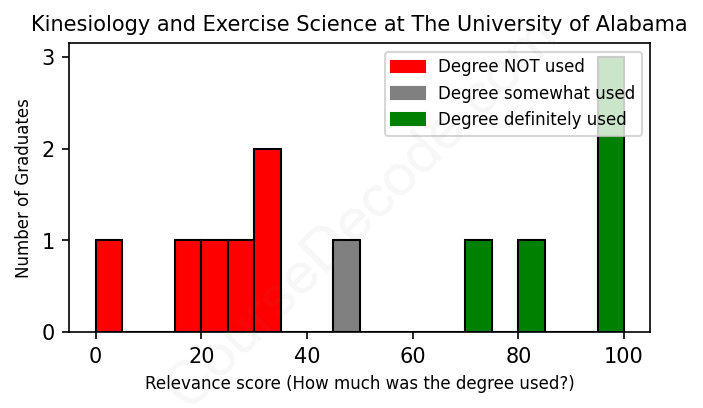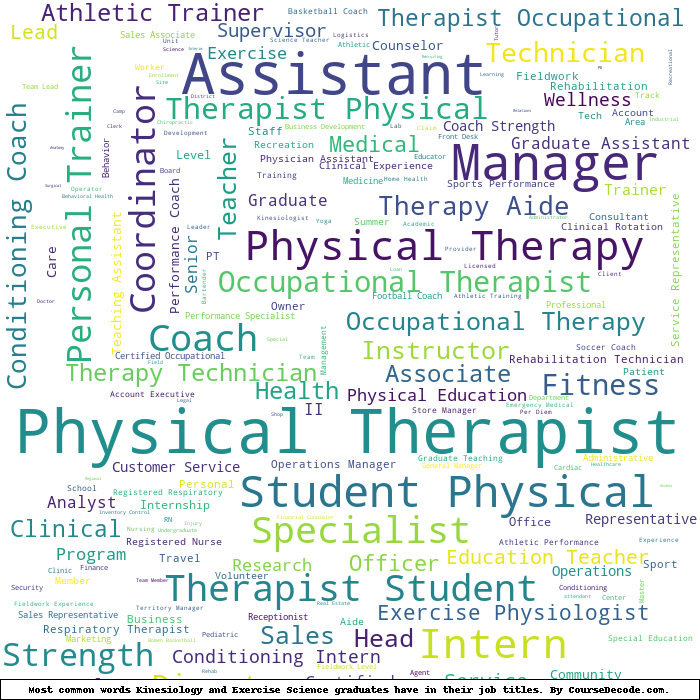
First, some facts. Of the Kinesiology and Exercise Science graduates from The University of Alabama we've analyzed , here's how many have used (or NOT used) their degree in their career:

These are estimates based on AI analysis of 12 LinkedIn profiles (see below).
The verdict? Significantly below average. Overall, with an average relevance score of 52%, Kinesiology and Exercise Science graduates from The University of Alabama have a much lower likelihood (-15%) of finding work in this field compared to the average graduate across all fields:
And for comparison, here's the chart for all profiles we've looked at across all degrees.
Also, after graduating, 41% of these graduates have pursued further education other than another Bachelor's degree (such as a Masters degree or other), compared to the average across all profiles of 35%. This suggests you may need more than just a Bachelors degree to be competitive as a Kinesiology and Exercise Science graduate.
See the details:
|
Relevance score: 25% We think this person has NOT gone into a career related to their degree. We think this person has NOT gone into a career related to their degree.
DEGREE INFOGraduated in 2014 from The University of Alabama with a Bachelor's degree in Kinesiology and Exercise Science. No other secondary education since. JOB HISTORY SINCE GRADUATIONProject Manager Society for Africans in the Diaspora | SAiD Institute Jan 2019 - Present Creative Director  Bronzevillage LLC Jan 2020 - Present Tax Specialist  LTD Tax Services & Business Solutions LLC Jan 2024 - Present ABOUTCreative manager and program developer at SAID Institute Pan African Library. |
The top 10 most common jobs done by the graduates we've analyzed (ranked most common to least) are:
Looking at the job paths taken by graduates from The University of Alabama who studied Kinesiology and Exercise Science, it's clear that many have found roles that connect either directly or indirectly to their degree. Some of the most prevalent jobs include positions in physical therapy, like Physical Therapy Technicians and Certified Respiratory Therapists, where the skills learned in their Kinesiology programs are very applicable in real-world settings. Additionally, roles such as Athletic Academic Advisor and Support Coordinator are also significant, as they combine their knowledge of exercise science with student-athlete support, showing a nice blend of their academic background and practical application.
However, not all jobs in this list align closely with Kinesiology and Exercise Science. Many graduates found themselves in roles like servers, clerks, or project managers where the connection to their degree is pretty weak. Even positions that involve some health-related tasks, like being a Medical Assistant, don’t fully utilize the specialized knowledge acquired through their studies. So, while there are definitely some pathways that make good use of their education, a large portion of graduates has taken jobs that don’t directly tap into the core skills and knowledge of Kinesiology and Exercise Science. Overall, it's a mix and definitely shows that having a degree in this field doesn't always guarantee a career that utilizes every aspect of what they learned!
Here is a visual representation of the most common words in job titles for Kinesiology and Exercise Science graduates (this is across all Kinesiology and Exercise Science graduates we've analyzed, not just those who went to The University of Alabama):

Graduates from The University of Alabama with degrees in Kinesiology and Exercise Science seem to have a diverse range of career paths post-graduation. Many of them kick off their careers in positions that are closely related to their field, like physical therapy technician roles or personal training. For instance, early jobs often involve working in rehabilitation settings, athletic departments, or as technicians in healthcare facilities. This trend suggests that the foundational skills they gain during their studies are effectively utilized right away, setting a strong starting point for their careers.
Fast forward five to ten years, and it looks like a good chunk of these graduates remain in healthcare and wellness-related roles. Some have advanced to more specialized positions, such as respiratory therapists or academic advisors in the athletic realm. Others have found their niche in management or sales related to medical technology, like the Mako Product Specialist role held by one graduate. However, there are also instances where individuals have drifted into roles that are less connected to Kinesiology, such as office management or project management in completely different sectors. Overall, while many graduates do appear to find fulfilling and relevant careers, there's a notable mix—suggesting that some may not be directly utilizing their degree in the long run. It’s a mixed bag, but with a solid foundation for those who stick to healthcare-related paths.
A Bachelor's degree in Kinesiology and Exercise Science can be a bit of a mixed bag in terms of difficulty, but generally, it’s not considered super tough compared to some other majors. At The University of Alabama, you’ll dive into subjects like anatomy, physiology, and biomechanics, which can be challenging if you're not super into the sciences. There’s definitely a lot of hands-on learning and practical application, which is great for those who like to get active. Overall, if you’re passionate about fitness and health, you'll probably find it more enjoyable than stressful, but like any degree, you’ll still need to put in the effort to keep up with coursework and assignments. It's definitely not the easiest major out there, but if you stay organized and focused, you can definitely handle it!
Most commonly, in the LinkedIn profiles we've looked at, it takes people 4 years to finish a Bachelor degree in Kinesiology and Exercise Science.
From checking out the job paths of these Kinesiology and Exercise Science grads from The University of Alabama, it seems like their salary levels vary quite a bit. The earlier grads, like the one from 2010, started off in roles that didn't scream big bucks, but over time, moved up into titles that likely pay better—like being an Athletic Academic Advisor. The 2014 grad jumped into project management and creative roles, which often come with decent pay, especially if they gain more experience. The 2015 grad, who became a Certified Respiratory Therapist, probably saw some solid income there, since healthcare jobs can pay well. On the flip side, some of the more recent grads, especially those just starting out or in service roles, might still be working their way up the pay scale. Overall, there’s a mix, but many seem to be on a path to financial improvement as they gain experience in their fields.
Here is a visual representation of the most common words seen in the "about" section of LinkedIn profiles who have a Bachelor degree in Kinesiology and Exercise Science (this is across all Kinesiology and Exercise Science graduates we've analyzed, not just those who went to The University of Alabama). This may or may not be useful:

Here are all colleges offering a Bachelor degree in Kinesiology and Exercise Science (ordered by the average relevance score of their Kinesiology and Exercise Science graduates, best to worst) where we have analyzed at least 10 of their graduates: